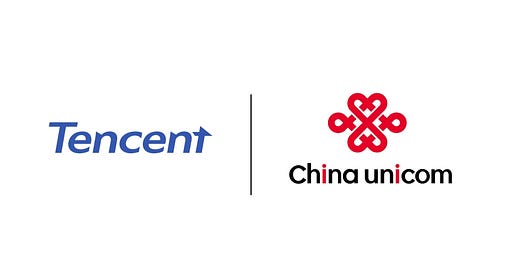Tencent and China Unicom Approved to Set Up Mixed-Ownership JV
According to an official document released on October 27 by the Anti-Monopoly Bureau under China’s State Administration for Market Regulation (SAMR), internet giant Tencent and state-owned telecommunications operator China Unicom have gained unconditional approval to establish a joint venture following the completion of a review on October 18. Affected by this news, China Unicom’s A shares rose on Wednesday afternoon to reach their daily limit. Meanwhile, as of 15:00 on November 2, China Unicom’s H shares had risen slightly by 1.2%, and those of Tencent Holdings were up by 1.4%.
According to public information, the newly established joint venture will be mainly engaged in the content delivery network (CDN) field and edge computing. It will be jointly controlled by subsidiaries of each firm, namely Shenzhen Tencent Industry Venture Capital and Unicom Innovation Venture Capital. After the transaction is completed, China Unicom, Tencent, and an employee stock ownership platform will respectively hold 48%, 42%, and 10% of shares.
Tencent and China Unicom have previously engaged in a range of interactions. Chinese business data platform Qichacha shows that Lu Shan, Senior Executive Vice President of Tencent, also serves as a director of China Unicom. Besides, China Qianhai (Internet) Exchange, a company established in 2021, has 18% of shares held by Unicom Innovation Venture Capital and 5% of those held by Shenzhen Tencent Industry Venture Capital.
Unicom Innovation Venture Capital was established in 2014. Its ultimate controller is China Unicom, and its main business spans communication and related facilities and services.
In August, 2017, China Unicom released a mixed-ownership reform plan, which became the focus of attention as it belongs to the first batch of basic telecom operation pilot enterprises with mixed-ownership reform conducted by state-owned enterprises in fields exhibiting monopolistic tendencies. It is believed that the competitiveness of state-owned telecommunications enterprises will be greatly enhanced by introducing strategic investors with synergy and leading advantages. In the same month, a subsidiary of China Unicom signed formal strategic cooperation framework agreements with Tencent, Baidu, JD.com, and Alibaba in Beijing.
The other two of the country’s three major telecoms operators, China Mobile and China Telecom, have also cooperated with domestic internet giants under the trend of mixed-ownership reform. On November 1, the Shanghai subsidiary of China Mobile signed a strategic cooperation agreement with JD Technology, a firm under JD.com, a leading e-commerce platform. The two sides will carry out innovative cooperation in the fields of platform-based smart city technology, digital governance, data center/cloud computing/big data, communications, international business, smart homes, and more.
China Telecom signed a comprehensive strategic cooperation agreement with tech giant Alibaba in May 2017. At the time, both sides announced that they were each other’s major strategic customers, and that they would jointly strengthen cooperation with China Telecom across five major areas – smart connection, smart home, new ICT applications, Internet finance, and the Internet of Things. Alibaba would meanwhile focus on its corresponding strengths in new retail, new manufacturing, new finance, new technology, and new energy. The two sides have also previously carried out cooperation in the fields of data centers, basic communication capabilities, e-commerce, mobile payment, and many others.
It is worth mentioning that reports surfaced on October 31 that a consortium headed by CITIC Group, one of China’s largest conglomerates, was in discussion with Naspers, a major shareholder of Tencent, to acquire its shares in full and win a controlling stake in Tencent. On November 1, Prosus, the largest shareholder of Tencent and a wholly-owned subsidiary of South African multinational internet, technology, and multimedia holding firm Naspers, responded, calling the report “speculative and untrue.”
At noon on the same day, Zhang Jun, General Manager of Corporate Marketing and Public Relations at Tencent, reposted a song named “Gossip” to his private social media account, writing, “Gossip goes around. I don’t know when it can stop.” According to Yicai, people close to CITIC’s investment department have flatly dismissed the notion of CITIC Group having plans to acquire Tencent shares.
Furthermore, rumors previously emerged that China Mobile, a multimedia services provider with a nationwide mobile telecommunications network, might take a stake in Tencent, although this possibility has been denied by the latter.





